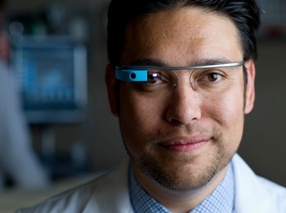US medical school integrates Google Glass into curriculum
28 May 2014
As physicians and surgeons explore how to use Google Glass, the University of California, Irvine (UC Irvine), School of Medicine is taking steps to become the first in the US to integrate the wearable computer into its four-year curriculum – from first- and second-year anatomy courses and clinical skills training to third- and fourth-year hospital rotations.
 | |
| Dr. Warren Wiechmann, assistant clinical professor of emergency medicine and associate dean of instructional technologies, will oversee implementation of the Google Glass four-year program at UCI (Photo: Steve Zylius/UC Irvine) |
Leaders of the medical school have confidence that faculty and students will benefit from Glass's unique ability to display information in a smartphone-like, hands-free format; being able to communicate with the Internet via voice commands; and being able to securely broadcast and record patient care and student training activities using proprietary software compliant with the 1996 federal Health Insurance Portability & Accountability Act.
To make this pilot possible, UC Irvine is collaborating with Pristine, a telehealth company based in Austin, Texas. Its product, Pristine EyeSight, is the only HIPAA compliant video-based communication platform optimized for Google Glass in healthcare environments.
''I believe digital technology will let us bring a more impactful and relevant clinical learning experience to our students,'' said Dr. Ralph V. Clayman, dean of medicine. ''Our use of Google Glass is in keeping with our pioneering efforts to enhance student education with digital technologies – such as our iPad-based iMedEd Initiative, point-of-care ultrasound training and medical simulation. Enabling our students to become adept at a variety of digital technologies fits perfectly into the ongoing evolution of healthcare into a more personalized, participatory, home-based and digitally driven endeavor.''
While other medical schools have been experimenting with Glass in medical practice and education, UC Irvine's comprehensive employment of the device will elevate the student experience unlike anything ever before, added Dr. Warren Wiechmann, assistant clinical professor of emergency medicine and associate dean of instructional technologies, who will oversee implementation of the Google Glass four-year program.
The effort will start this month – as the academic year begins for third- and fourth-year students – with 10 pairs of Glass. Preliminary plans are to utilise them in the operating room and emergency department.
Integrating the devices into medical education complements the ongoing clinical use of Glass at UC Irvine Medical Center, where the technology has already been piloted in operating rooms, intensive care units and the emergency department in order to assess its impact on physician efficiency and patient safety.
An additional 20 to 30 pairs of Google Glass will be acquired and deployed in August, when first- and second-year students begin course work. They will be incorporated into anatomy labs, the medical simulation center, the ultrasound institute, the Clinical Skills Center and even the basic science lecture hall.
Here, Glass will be used to transmit real-time patient-physician encounters in specific disease areas to augment the basic science lecture; the transmission will occur over the 16 miles between the medical center's Orange campus and a lecture hall in Irvine.
''Medical education has always been very visual and very demonstrative, and Glass has enormous potential to positively impact the way we can educate physicians in real time,'' Wiechmann said. ''Indeed, all of medicine is based on 'seeing,' not 'reading,' the patient.''
When faculty wear Google Glass for instruction, he added, it gives students an unprecedented first-person perspective.
Conversely, when students are wearing Glass, they can take advantage of pertinent information delivered directly into their line of sight by faculty members, who can see exactly what a student sees and thus better guide a dissection or simulation exercise.
''The most promising part is having patients wear Glass so that our students can view themselves through the patients' eyes, experience patient care from the patients' perspective, and learn from that information to become more empathic and engaging physicians,'' Wiechmann said.
Google Glass joins other technologies at the core of the iMedEd Initiative in the School of Medicine. Launched in August 2010, the initiative involves an iPad-based education platform – every medical student is equipped with an iPad filled with electronic medical texts, podcasts, reference materials and notes for all course work and clinical experiences – along with training on point-of-care ultrasound devices and state-of-the-art medical simulation. UC Irvine's medical school was the first to employ tablet computing in the curriculum and the second to include point-of-care ultrasound training.
Clayman said that the iMedEd Initiative appears to have enhanced student learning. He pointed to scores on Step 1 of the US Medical Licensing Examination – taken at the end of the second year of medical school – as an example.
The first two classes participating in the iMedEd Initiative scored an average of 23 percent higher than previous classes, despite having similar incoming GPAs and scores on the Medical College Admission Test.
The iMedEd Initiative is fully supported by philanthropic contributions.


















